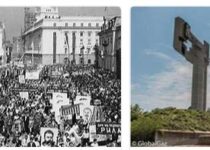Bulgaria History: From 1919 to Post-Communist Governments Part I
The defeat forced Ferdinand to abdicate in favor of his son Boris III. In the twenty years between the two wars, Bulgaria had a politically agitated internal life: initially (1918-1923) governed by an alliance between the Agrarian Party of A. Stambolijski and the Communist Party, it saw numerous social reforms promoted, despite the very serious difficulties and the influx of large numbers of refugees from territories lost in the war.
In 1923, however, according to Intershippingrates, Stambolijski was assassinated in a coup and the sovereign gave the government to A. Tsankov, who established a far-right regime unleashing the “white terror” in the country for two years; in 1926 Tsankov was fired and replaced by a more moderate cabinet, but two new coups in 1934 and 1935 resulted in a direct government by the sovereign, with the Italian-German axis (1937). An object of contention between Germany and the USSR (1940-41), it was occupied in March 1941 by the Germans, participated in the war against Greece and Yugoslavia, but remained neutral in the Axis war against the USSR and did not hand over the resident Jews to the Nazis (yes, instead, those residing in the territories taken from Greece and Yugoslavia). In 1943 Boris III died mysteriously, perhaps murdered, and was succeeded by his son Simeon II, only six years old, under the regency of an uncle. Invaded by the Soviet army in September 1944, and already traveled by partisan formations made up of communists and agrarians for months, Bulgaria quickly concluded the armistice and was completely occupied. The peace treaty was signed on February 10, 1947, with it Bulgaria lost the conquests made during the war against Yugoslavia, while retaining southern Dobruja, returned to it already in September 1940 by Romania on the initiative of the Axis. Governed by a National Front, under the hegemony of the Communist Party, Bulgaria chose by referendum to become a people’s democratic republic (September 1946), sending the little king Simeon II into exile. The former secretary of the Comintern, G. Dimitrov, was the founder of the Bulgarian communist regime and, with Tito, the creator (meeting in Bled, 1947) of a Balkan communist federation, including Yugoslavia, Bulgaria and a Macedonia separated from Belgrade and Sofia. A project that collapsed between controversies and conflicts with the break between Tito and Stalin and the expulsion of Yugoslavia from the Cominform. Dimitrov, due to the agreement with Tito, was forced to give up power and died shortly after under mysterious circumstances (1949).
His successor VV Červenkov, rigidly loyal to the Stalinist line, eliminated the Titoite sympathizers (Deputy Prime Minister T. Kostov he was executed in 1949) and put in place a harsh collectivization of the countryside, together with a policy of violent nationalism and continuous tension with Yugoslavia over the Macedonian question. After 1953, a slow process of de – Stalinization also took place in Bulgaria. While the alliance policy with the USSR took shape with the accession to COMECON (1959) and the Warsaw Pact (1955), Červenkov was replaced at the head of the party by T. Živkov (1954) and at the head of the government by A. Yugov (1956). In 1962 Živkov also became prime minister and, after the 1971 constitutional reform, head of state. Reaffirmed in 1976, 1981 and 1986, he made Bulgaria the most faithful ally of the Soviet Union in the Balkan area. However, this did not prevent him from establishing good relations with Greece starting from 1980, while relations with Yugoslavia remained bad, due to the Macedonian question, and relations with Turkey, due to the real persecution to which the citizens of Turkish ethnicity, forced to Slavicize their names. In November 1989 the internal repercussions of the great changes underway in most of the other Eastern countries, with the request for greater liberalization, led to the dismissal of Živkov, Petar Mladenov and, from February 1990, Aleksander Lilov), which from April 1990 also changed its name to the Bulgarian Socialist Party (PSB); but the next seven years would be one of great crisis and great instability.
From the free elections of June 1990, the PSB emerged as the winner, acquiring the majority of the seats in the newly formed Constituent Assembly; but two months later the presidential elections were won by the opposition of the Union of Democratic Forces (UFD), which led to the highest office of the state Želju Želev, in August 1990, generating a certain political dualism, with the head of state on different positions from those of the government of Andrei Lukanov, of the PSB. Immediately facing a situation of serious social tension, Lukanov resigned (December 1990), replaced by a government of national unity, which ruled the country until October 1991, when new legislative elections registered the victory of the UFD, whose leader Filip Dimitrov assumed the leadership of the first non-communist government.
The electoral result was not, however, so clear-cut, effectively assigning to the Movement for Rights and Freedoms (MDL), an expression of the Turkish minority, the role of arbiter of the political framework with its 24 seats. Thus, while the presidential elections of January 1992 confirmed Želev at the top of the state, after a few months the MDL broke the coalition with a UFD that showed evident signs of fraying. The crisis was resolved in December of the same year with the appointment of Ljuben Berov (MLD) as prime minister of a government supported by the PSB, confirming the great influence still maintained in the country by the old former communist apparatus. This was matched by the difficulties of the democratic grouping: in fact, in June 1993 the vice-president Blaga Dimitrova resigned in controversy with Želev, who was contested by most of the UFD.



